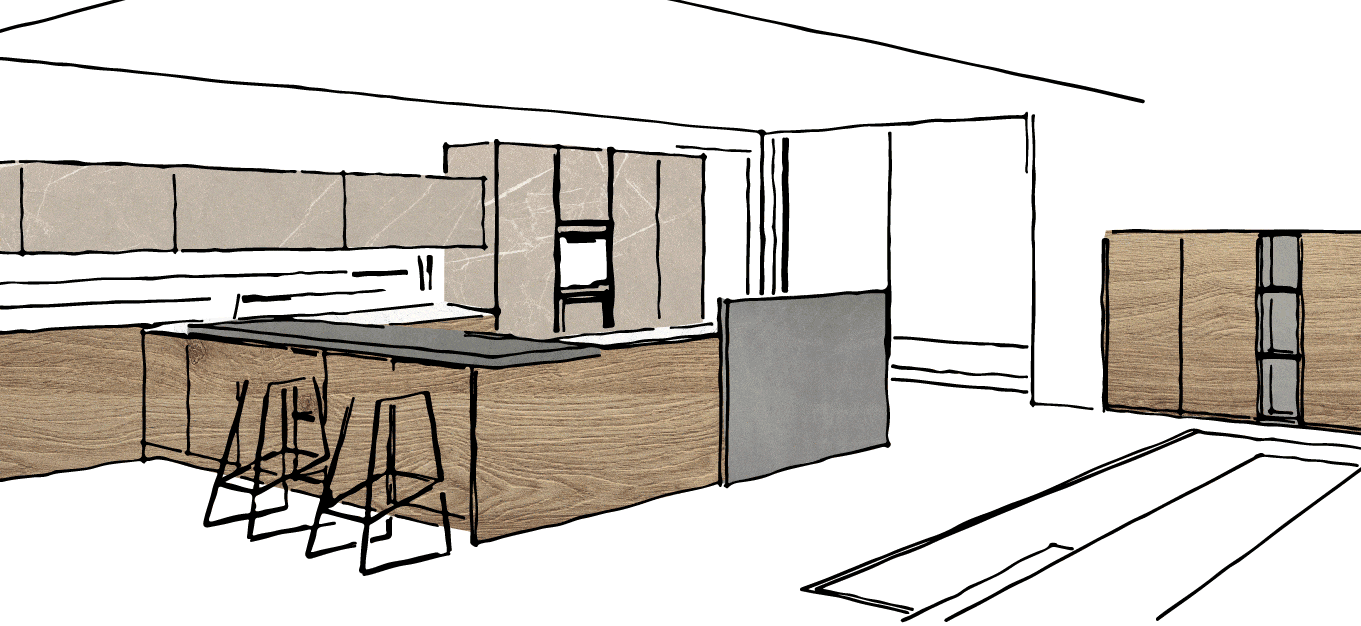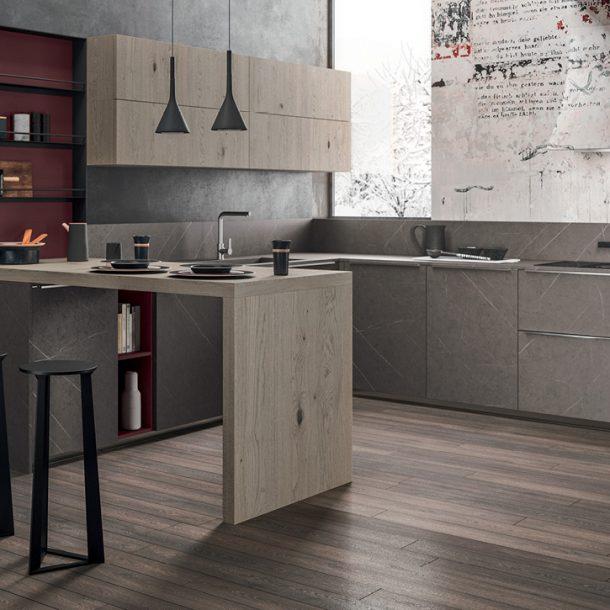
ECO-SUSTAINABLE KITCHENS: HOW TO CHOOSE THE GREENEST SOLUTIONS
Sustainability: not just a question of materials, but also of conscious choices. Let’s take a look at how we can reduce the environmental impact of a kitchen.
Global warming, climate change and the gradual diminishing of natural resources have made issues regarding eco-sustainability ever more urgent, contemporary and universal. We must change from simply adopting an attitude to acting now to improve things and safeguard the future of our planet through the use of technologies, instruments and behaviour that reduces impact on the environment to a minimum.
Even choosing kitchen furniture and the way we use it can be green. Let’s see how.
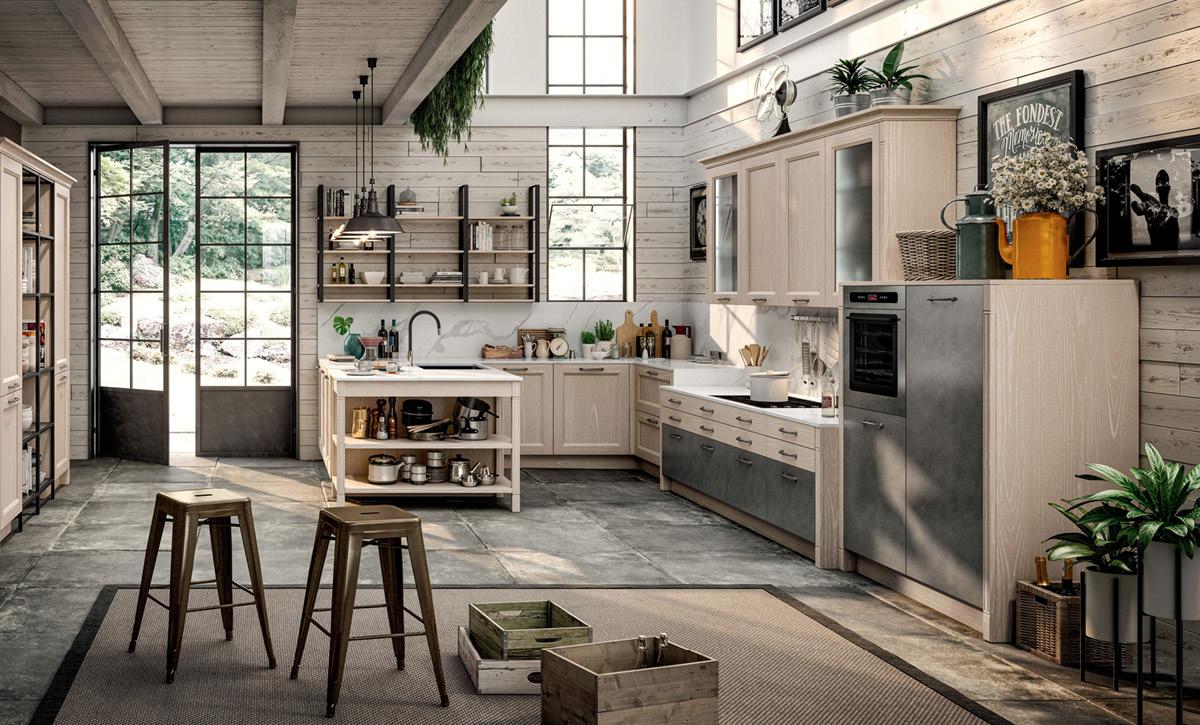
WHAT DO WE MEAN BY ‘ECO-SUSTAINABLE KITCHEN’?
Making a kitchen eco-sustainable starts with the choice of materials, which may be natural or come from sustainably processed recycled sources. However, there are other factors, such as the choice of energy efficient appliances and induction cooking hobs, and the layout of the kitchen so that it benefits as much as possible from natural light.
On the issue of lighting, using low consumption LED lights is taken for granted. Add to these aspects the care and good practices to apply before and after purchasing kitchen furniture. Buying from a local company, or at any rate a local dealer and/or installer will mean easier and shorter transport routes, thereby reducing pollution and CO2 emissions, as well as requiring lighter packing and less protection than that for long hauls.
Good practices such as taking care not to waste water and separating household waste properly mean making virtuous use of the kitchen so that every day we contribute in some small way to protecting the environment.
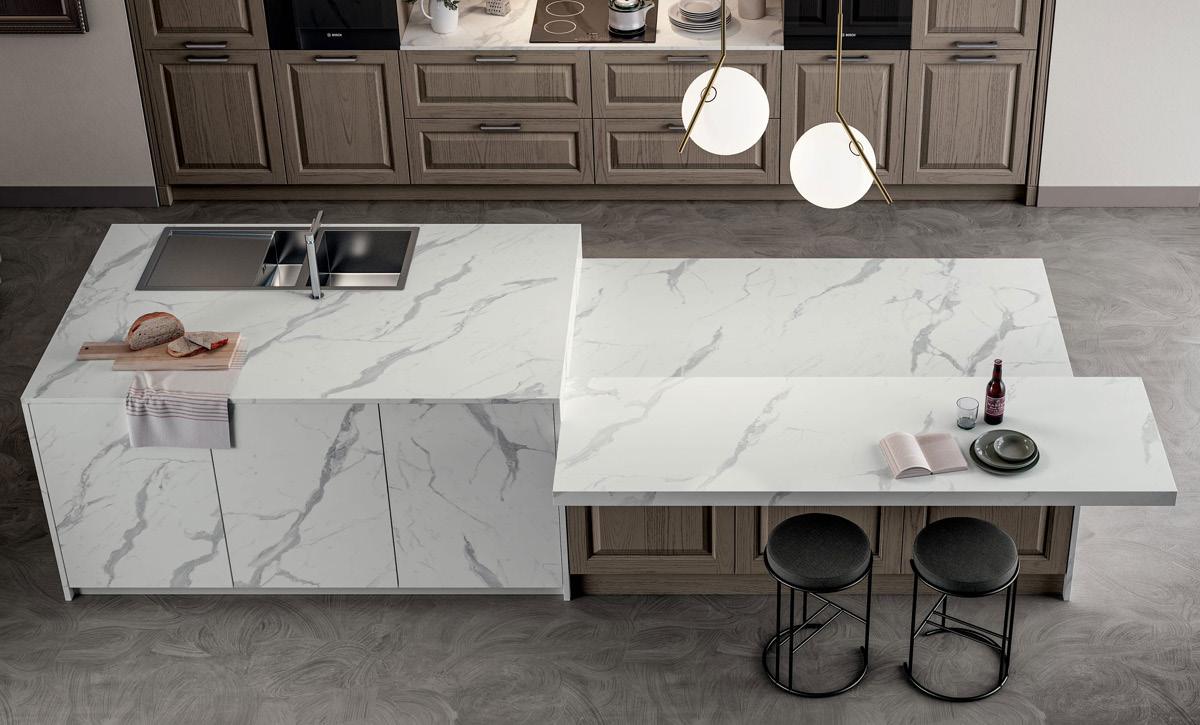
MATERIALS FOR A GREEN KITCHEN
The furniture trade, particularly that of kitchen furniture, is constantly evolving in its search for innovative, durable materials that are increasingly greener.
Natural materials, such as wood, stone and marble, are joined by new solutions created from natural elements, such as ecological, nontoxic, water-based paints, and new materials derived from recycling.
The way in which these materials are transformed and processed is extremely important, as it must guarantee reduced CO2 emissions and restrict production wastage and the release into the environment of polluting waste.
Some examples of eco-sustainable materials for your kitchen:
Wood
Natural materials are not necessarily sustainable. That’s why it’s essential that the timber used comes from certified, sustainably managed forests that protect our forest heritage and the entire ecosystem, and that it is processed restricting, or even eliminating, the use of substances such as formaldehyde.
Wood can be treated with natural oil, water-based, nontoxic paints and heat processes that make it water repellant, easy to clean and resistant without affecting its natural qualities.
Recycled wood is increasingly popular, salvaged from old buildings and mountain huts or sourced from trees uprooted by natural events, such as the Vaia windstorm of 2018.
Natural Stone
Marble and granite are also natural materials, but the way they are quarried and processed produces huge quantities of rejects. That’s why slabs made of a mix of powder or chips from raw materials and compacted with natural resins are becoming popular on the market. These slabs can be reproduced in infinite colour schemes and are much easier to process, cut to size and fit without forgoing visual appeal every bit as good as that of expensive marble.
Steel
Easy to shape and fit, steel is also hygienic, easy to clean and antibacterial and is one of the most popular materials in the kitchen.
It is also eco-sustainable because the production processes require limited amounts of energy and heat, and it can be recycled infinitely. For this reason, most of the steel used in the kitchen comes from the recycling of discarded steel items and components.
Stoneware
Stoneware is the result of a mix of natural raw materials, mainly sand and clay, and is 100% recyclable. However, it is important to quarry and process the raw materials sustainably. That’s why, before purchasing, it’s a good idea to check the certification displayed by the manufacturer with regard to the different stages of production.
The Laminam brand produces one of the most popular stoneware products on the market. Innovative technologies are used to create extremely tough, slim slabs featuring an exclusive photocatalytic process that makes surfaces in this material self-cleaning for greater hygiene.
Gentili Cucine provides 18 different finishes for kitchen worktops in Laminam.
Ecomalta
Ecomalta, also known as cementitious resin, comprises water and nontoxic components such as wax and emulsifiers mixed with aggregates from certified recycling processes.
Flame retardant, breathable, unaffected by brusque temperature changes, and antistatic, Ecomalta is suitable for direct contact with food as it contains no epoxy resins, toxic substances or micro particles, qualities that make it a favourite for kitchen worktops.
Fenix
Fenix is a special kind of laminate produced with nano-technologies, giving it a smooth matt surface and making it fingerprint proof and pleasant to touch. Above all, it has the exclusive feature of heat repairing surface scratches and scuffs in a way that fully restores the damaged surface.
It is an extremely durable material and can be considered sustainable because its use reduces the production of waste. However, it is the production process in particular that makes it green, and the manufacturer Fenix NTM has achieved Greenguard Gold certification, which guarantees that it does not release harmful VOCs (Volatile Organic Compounds). Technological innovation and natural raw materials, particularly cellulose and resins, considerably reduce CO2 emissions and primary energy needs for its production.
Cosmolite®
Manufactured by Stone Italiana, this material comes in slabs composed entirely of aggregates from pre-consumer recycling, excluding quartz, with perfectly washable surfaces and great visual appeal, as well as a high standard of hygiene.
Produced and processed entirely in Italy by means of a sustainable production process, this product does not waste water and uses 100% clean energy.
Okite®
A hygienic material that is unaffected by difficult stains, such as those made by coffee, lemon and vinegar, and is five times tougher than marble and granite, Okite® is made of over 90% quartz, to which are added resins and natural pigments.
Its manufacture also involves recycled glass, efficient use of natural components, and a certified eco-sustainable production process.
Lapitec
Lapitec is sintered stone made of minerals and stone particles bonded by a 1250°C heat process which makes slabs comprising only natural raw materials, with no petroleum by- products. It is created by a vacuum vibro-compression process, where mineral grains are bonded without the need for resins or binders. Completely inert, this material releases no substances into the environment and is infinitely recyclable.
PET, Aluminium and Glass
PET, aluminium and glass are certainly eco-friendly because they too are infinitely recyclable.
PET is a synthetic material mainly used in the food industry, for example for water bottles that can be recycled to produce grip profiles, plinths and other kitchen components.
Aluminium is also popular for kitchen decor and is used for grip profiles, plinths, handles and cabinet door frames, to name just some elements. Its main component is bauxite, a mineral extracted from ore deposits, although nowadays most aluminium comes from recycling, which reduces the use of natural resources.
Glass also comes principally from continuous recycling and is mainly used in the kitchen for shelves, cabinet doors, doors and splashbacks.
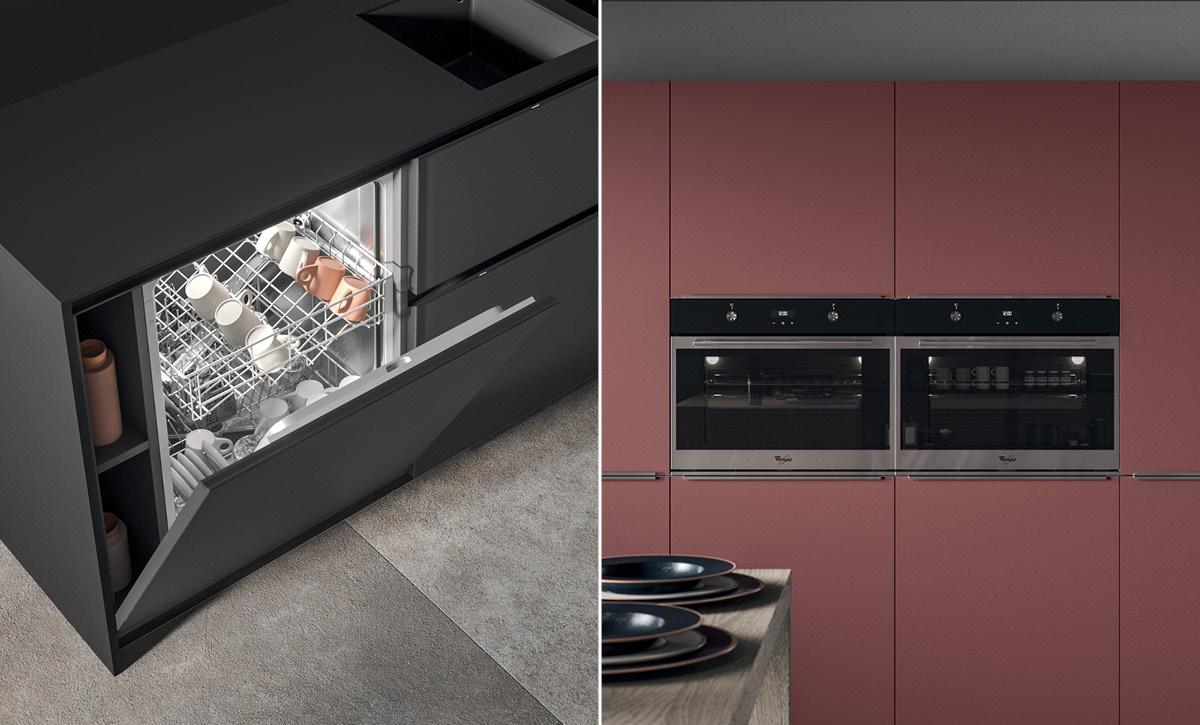
ENERGY EFFICIENT HOUSEHOLD APPLIANCES
The choice of appliances for an eco-sustainable kitchen will necessarily aim for energy efficiency class A, A++, A+++ and so on.
Today’s technologies make it possible to constantly monitor consumption and set ecological programs for cookers and dishwashers.
Many induction cooking hobs, for example, can avoid overloading by automatically adjusting to the home meter to regulate absorbed power.
Also available are ovens that cook with steam and at low temperatures. Provided with a wireless probe to measure internal temperature, they can cook different foods simultaneously at differentiated temperatures.
Nowadays household appliances are increasingly smart, connected to each other and provided with functions to reduce consumption and therefore environmental impact.
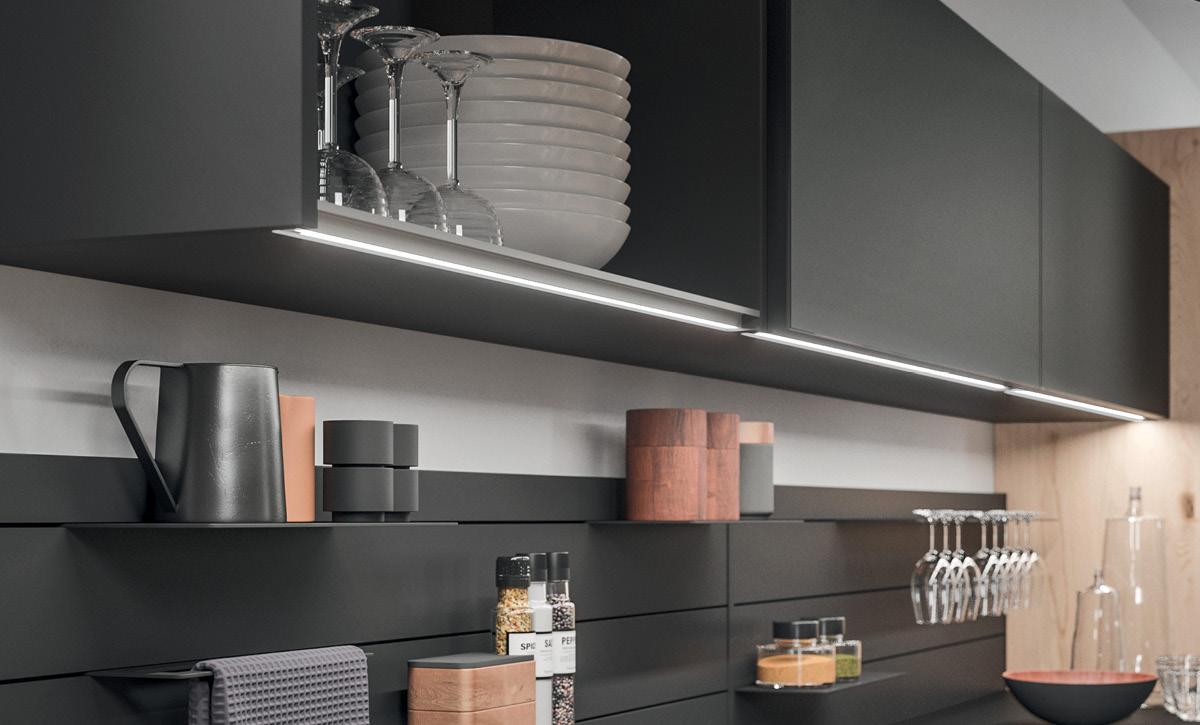
LIGHTING
Lighting is a fundamental component of a kitchen. Constant progress in this field has led to solutions that combine good looks, practicality and sustainability also in the kitchen. LED lights are certainly the ideal solution. Besides saving considerably more energy than traditional CFL ones, LED lamps are mercury free, which makes them easy to dispose of and entirely recyclable.
The use of spotlights is warmly recommended because they direct light to where it’s most needed, and avoids illuminating a whole room unnecessarily.
Gentili Cucine provides several sustainable lighting solutions, from recessed spots to original solutions like the Oslo LED integrated into grip profiles, and a range of variants with which to create strip or spotlights that can also be dimmed to regulate intensity and consumption.
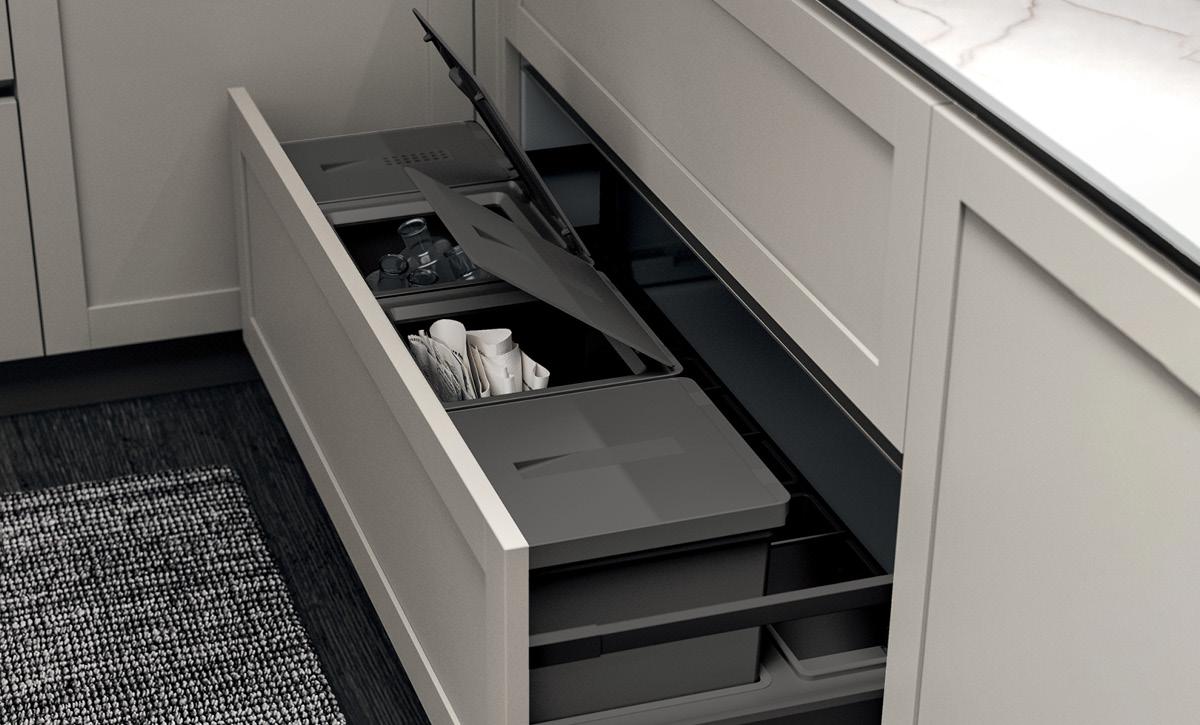
WASTE MANAGEMENT
A green kitchen also means efficient waste management. It is essential for the area under the sink to be equipped with containers dedicated to separate waste collection so that operations are practical and tidy. Often, waste collection is facilitated by containers on pull-out slides that make them easy to fill and empty.
Increasingly popular are dissipators and sink refuse disposal units for eliminating organic waste or compacting it.
CERTIFICATION
There are a host of certifications relating to environmental sustainability, too many to mention here. Below is a list of just some of them linked to materials, emissions, and production processes.
FSC®
The best-known certification regarding wood, it certifies that timber comes from woods and forests managed to strict ecological, economic and social standards.
Gold Standard
Established in 2003 by the WWF and other international climate-protecting organisations, Gold Standard is an independent entity that sets quality standards for climate protection projects. It ensures that the highest quality standards are observed, not only for projects under the Clean Development Mechanism (CDM), but also for those implemented within the framework of voluntarily financed projects for climate protection.
EU Ecolabel
The EU Ecolabel is the European Union’s ecological quality label that distinguishes products such as, for example, household appliances that guarantee high performance but also reduced environmental impact throughout their life cycles.
UNI EN ISO 14001
European standards that specify the requirements of the Environmental Management System, with special attention to energy and raw materials consumption, noise pollution, emissions into the atmosphere and industrial waste management.
